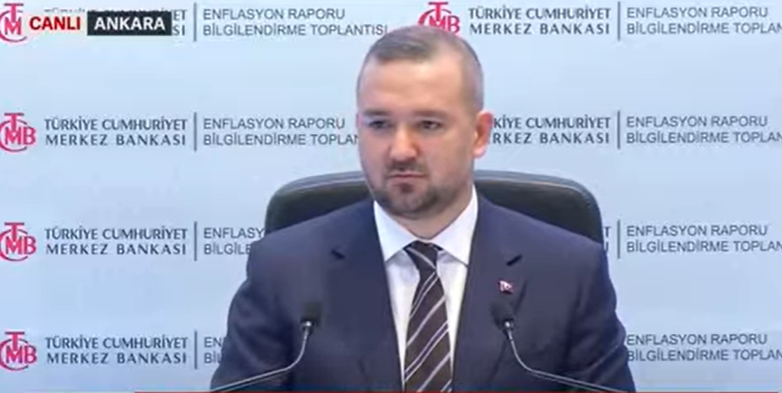Fatih Karahan, the governor of the Central Bank of the Republic of Turkey, gave his most solid message to date to foreign investors worried about an early rate cut, saying they want to make sure they can meet their inflation targets beyond this year before discussing the timing of a rate cut.
In his first face-to-face interview since becoming governor, CBRT Governor Fatih Karahan told Bloomberg that the steps to be taken in the policy rate should be adjusted to achieve inflation targets for 2025 and beyond. Inflation fell for the first time in eight months in June, leading to speculation that the CBRT could cut its policy rate of 50 percent. While many analysts expected the CBRT to cut rates in the fourth quarter, Goldman Sachs had expected a rate cut this quarter.
Speaking at the CBRT’s building in Istanbul on Thursday, Karahan did not comment on the timing of the rate cut, but said, “We need to maintain our cautious approach.” The biggest obstacle to monetary easing after the disinflation process and domestic demand started to weaken has been the difference between the inflation expectations of firms and households and the CBRT’s forecasts. The CBRT expects inflation to fall to 38 percent by the end of this year, 14 percent by the end of 2025 and 9 percent by the end of 2026. Karahan said, “Meeting this year’s target is critical to gain credibility and we are doing whatever it takes to do so. But it is important to note that this is not the ultimate target,” Karahan said.
“We expect a clearer improvement in expectations”
According to the CBRT data, households and firms differ from the markets in 12-month inflation expectations. Households expect CPI inflation of around 70 percent at the end of this year, while market participants’ expectations converge to 42 percent, the upper band of the CBRT forecast. “We want to see a clearer improvement in household and firm expectations. Thus, we can be a little more comfortable that inflation expectations will support the disinflation process.”
Karahan will present the CBRT’s inflation report in Ankara next month. Karahan said that although the June inflation data came in lower than economists’ expectations, it was “premature” to conclude that this decline was serious and lasting. The CBRT Governor expects the increase in electricity and administered prices to add 1.5 percentage points to monthly inflation in July.
For the CBRT, restrictive policy is critical to weaken demand and maintain a healthy current account balance. Demand moderation represents a sharp reversal from the policies implemented by President Recep Tayyip Erdoğan’s administration before the May 2023 elections. Access to cheap credit despite high inflation had led to an explosion of consumption and distorted expectations. At the time, critics of this policy warned of a balance of payments crisis. The new economic team, including Karahan, is trying to rebalance the composition of growth in favor of lowering inflation through mainstream policies.
“We are not engineering the real appreciation of the lira”
According to Karahan, one of the “results” of the tight policy has been the real appreciation of the Turkish lira. “We are not engineering the real appreciation of the lira. This is more of a direct consequence of this policy where interest rates are high.” While the policy has made lira-denominated assets more attractive and boosted demand for them, it has also ultimately led to a real appreciation of the currency.
Global banks such as Goldman Sachs had said there was “limited room” for the lira to appreciate due to potential concerns such as declining competitiveness and exporters’ demand for higher exchange rates. Karahan noted that monetary policy has reduced domestic demand and anchored inflation expectations, both of which have significantly reduced imports. Although the appreciation in the real exchange rate makes exports more expensive, Karahan said the effect on the current account deficit is to improve, as it anchors inflation expectations. Still, the authorities are cautious to prevent the lira from overvaluing, and regulations on offshore lira are being put in place to do so. While the authorities are coordinating, Karahan said that the regulations on offshore swaps are under the responsibility of the BRSA. According to the CBRT governor, the regulations in place so far have helped to make the liquidity problem more manageable.
“We will continue to accumulate reserves”
Karahan “We need to strike a balance between improving our reserve position and achieving our main objective of disinflation. Disinflation requires avoiding excess liquidity and the vulnerability created by capital flows. We have managed these trade-offs well and the lack of regulatory easing has helped us.”
Foreign investors seeking to hedge their positions are demanding easier access to the lira. While the authorities do not want an increase in volatility, the previous administration had implemented these rules to prevent short positions against the lira.
According to Bloomberg Economics, the CBRT increased its reserves to an extent not seen in the last 40 years in the face of very large capital flows in the second quarter. Pointing to the need to increase reserves further, Karahan said that their main goal is to achieve disinflation. “We will continue to prioritize price stability and accumulate reserves to the extent that market conditions allow,” Karahan said.
Karahan stressed that the CBRT may want to reduce its FX liabilities in the future and that deposit agreements with foreign central banks may be reviewed.
